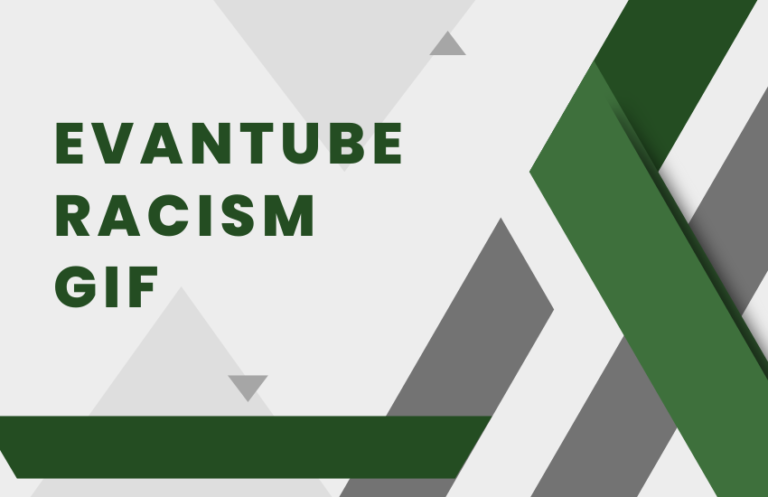The digital age has brought a new set of challenges and opportunities, particularly when it comes to addressing racism in media. One recent controversy that highlights this issue involves evantube racism gif, a popular content creator, and a GIF that sparked a significant backlash. Understanding the implications of this controversy is crucial for navigating the complex landscape of media representation today.
Understanding Evantube
Evantube racism gif is a well-known figure in the world of digital content creation, primarily famous for his engaging videos on YouTube. With a focus on entertainment and family-friendly content, Evantube has amassed a large following. His videos often feature toy reviews, vlogs, and other light-hearted content aimed at younger audiences.
What is a GIF?
A Graphics Interchange Format (GIF) is a type of digital image that supports both animated and static visuals. GIFs are incredibly popular on the internet for their ability to convey emotions, reactions, and short, looping animations in a succinct manner. They are widely used on social media platforms, messaging apps, and websites to enhance communication and engagement.
The Role of GIFs in Social Media
GIFs have become a staple in online communication, providing a dynamic way to express emotions and reactions. Their ease of sharing and ability to capture nuanced expressions make them a powerful tool for spreading information quickly. However, this rapid dissemination also means that problematic content, including racist imagery, can spread just as swiftly.
Racism in Media
Racism in media refers to the portrayal or promotion of prejudiced views against individuals or groups based on race or ethnicity. This can manifest in various ways, from stereotypes and biased reporting to outright racist content. Historically, media has played a significant role in reinforcing racial stereotypes and discrimination.
Incidents of Racism in Evantube’s Content
Recently, Evantube faced criticism over a GIF that was perceived as racially insensitive. The GIF, which was part of a larger piece of content, drew widespread condemnation for its offensive implications. This incident has raised questions about the responsibility of content creators and the impact of their work on diverse audiences.
Analyzing the GIF Controversy
The GIF in question was met with immediate backlash from viewers and commentators. Many felt that it perpetuated harmful stereotypes and failed to respect cultural sensitivities. The reaction from the public highlighted the need for content creators to be more mindful of their choices and the potential impact of their media.
Impact of Racist Content
Racist content can have severe effects on viewers, including reinforcing negative stereotypes and contributing to a culture of intolerance. For content creators, the consequences can include damaged reputations and loss of audience trust. Addressing these issues promptly and effectively is crucial for maintaining credibility and fostering positive engagement.
Addressing Racism in Online Media
Preventing racism in online media involves several key steps. Content creators should educate themselves about cultural sensitivities and actively avoid perpetuating stereotypes. Additionally, having diverse teams and seeking feedback from various perspectives can help create more inclusive content. Reporting mechanisms for problematic content are also essential for holding creators accountable.
Evantube’s Response
In response to the controversy, Evantube issued an official statement addressing the concerns raised by the GIF. The statement included an apology and an outline of actions taken to address the issue, such as revising content practices and engaging with experts on cultural sensitivity. This response is a step towards rebuilding trust and ensuring more thoughtful content creation in the future.
The Importance of Diversity in Content Creation
Promoting diversity in media is not just about avoiding offensive content; it’s about celebrating a wide range of perspectives and experiences. Inclusive media can enhance creativity, foster understanding, and build connections across different communities. Content creators are encouraged to embrace diversity and reflect it positively in their work.
How to Promote Positive Content
Content creators can promote positive media by prioritizing inclusivity and authenticity. Engaging with diverse voices, avoiding harmful stereotypes, and actively seeking feedback can lead to more meaningful and respectful content. Building a community that values constructive dialogue and empathy is key to fostering a positive online environment.
Educational Resources on Racism
For those looking to deepen their understanding of racism and its impact, numerous resources are available. Books, articles, and online courses provide valuable insights into the complexities of racial issues and media representation. Engaging with these resources can help individuals and creators navigate these challenges more effectively.
Future of Media and Racism
The future of media will likely see continued efforts towards more inclusive and respectful representation. Trends indicate a growing awareness of the need for diversity and the impact of racist content. As media evolves, there is hope for a more inclusive landscape where all voices are heard and respected.
Conclusion
Addressing racism in media is an ongoing challenge that requires vigilance, education, and action. The Evantube GIF controversy serves as a reminder of the importance of thoughtful content creation and the need for sensitivity in all media forms. By embracing diversity and fostering constructive dialogue, content creators can contribute to a more inclusive and respectful digital world.
FAQs
What is a GIF?
A GIF is a digital image format that supports animated and static visuals, commonly used to express reactions and emotions online.
How can racism in media be addressed?
Racism in media can be addressed by promoting diverse perspectives, educating content creators, and implementing effective reporting mechanisms for problematic content.
What are the impacts of racist content on viewers?
Racist content can reinforce negative stereotypes, contribute to a culture of intolerance, and negatively affect viewers’ perceptions and attitudes.
How has Evantube responded to the controversy?
Evantube issued an apology and outlined steps to address the issue, including revising content practices and engaging with cultural sensitivity experts.
Where can I find resources on media diversity?
Resources on media diversity include books, articles, online courses, and workshops that provide insights into inclusive media practices and racial issues.


